Florida’s climate can be challenging for many plants! If you want Best Flowers to Plant in Florida, you’re at the right place!
Florida has a distinct climate compared to the other states of USA. It falls under the USDA zones 8-10 and is home to both tropical and subtropical plants. If you are looking forward to growing some beautiful blossoms there, then you’ve arrived at the right place! Read on the article to find out the Best Flowers to Plant in Florida!
Check out our article on the best Russian flowers to grow here!
Best Flowers to Plant in Florida
1. Coreopsis
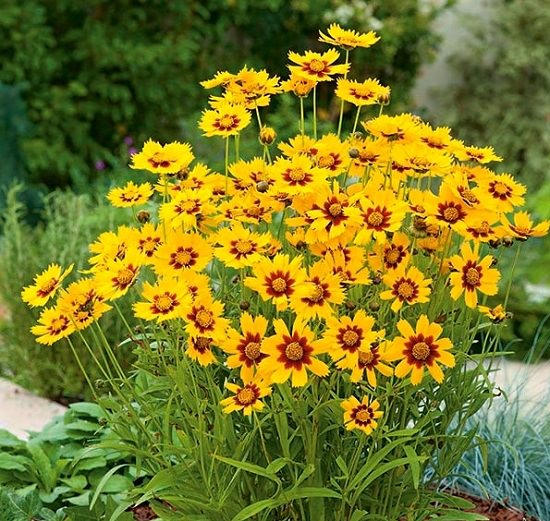
Botanical Name: Coreopsis spp.
USDA Zones: 4-9
Coreopsis is also known as tickseed and pot of gold. It produces pink, orange, red, and yellow flowers. This drought-tolerant, low-maintenance plant is ideal for borders or as a filler. You can grow this variety in well-draining, sandy soil, under full sun to partial shade.
2. Gerbera
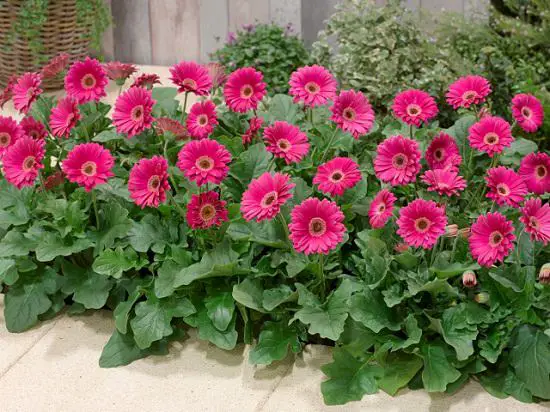
Botanical Name: Gerbera
USDA Zone: 8-11
Gerbera daisy is a herbaceous perennial that can grow up to 10-18 inches tall and 1-2 feet wide. The plant features ray-like petals, of pale pastel yellow, pink to bold orange color and red flowers. This vivid colored plant prefers rich, moist soil and full sun to partial shade.
3. Bolivian Sunset Gloxinia
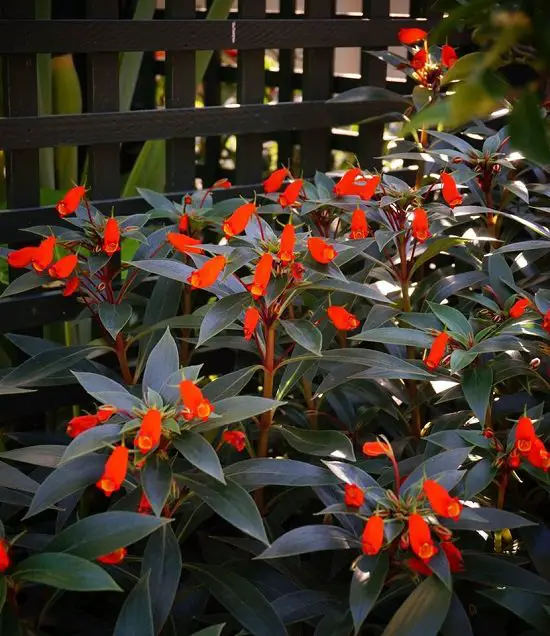
Botanical Name: Gloxinia sylvatica
USDA Zone: 9-11
‘Bolivian Sunset,’ is a herbaceous perennial and is perfect for Florida snowbirds. The plant flowers from fall till spring and forms beautiful red-orange blossoms. Grow this winter-flowering shrub in partial shade in well-draining and moist soil.
4. Salvia
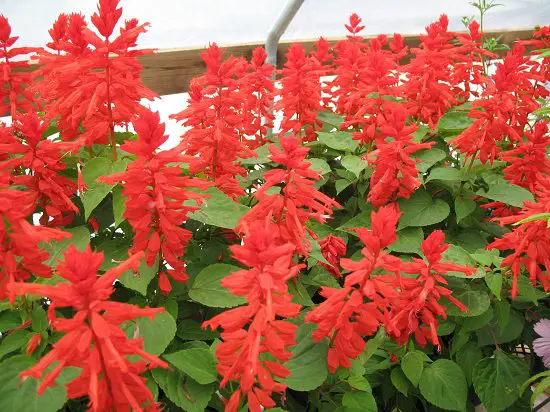
Botanical Name: Salvia spp.
USDA Zone: 8-10
Annual salvia is a tender perennial, which is prized for its rich blue, white, or red flowers. The beautiful plant can reach up to 12-24 inches tall. Grow annual salvia in an area that receives 6-8 hours of direct sunlight in well-drained, and rich soil.
5. Golden Dewdrop
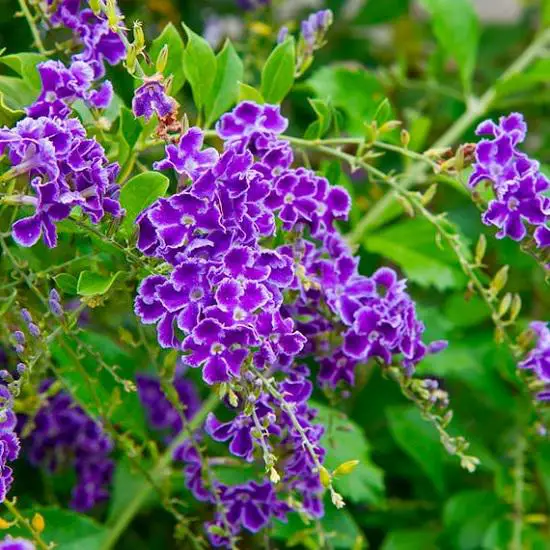
Botanical Name: Duranta erecta
USDA Zone: 9-11
Golden dewdrop is a tropical flowering shrub. It features beautiful white or blue flowers all summer long. The plant can grow up to 2-3 feet tall. It does well in full sunlight, though it can manage in partial shade as well, which makes it the best flower to plant in Florida!
Note: In tropical areas, golden dewdrop flowers on and off throughout the year.
6. Evolvulus
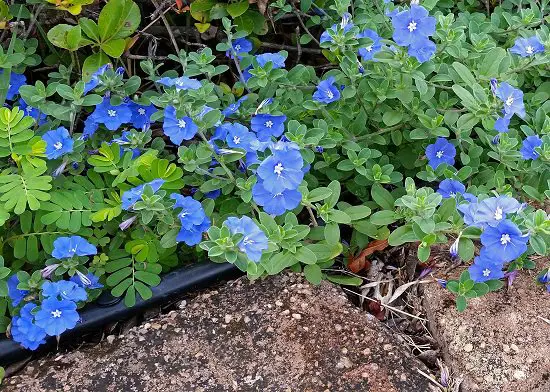
Botanical Name: Evolvulus pilosus
USDA Zone: 8-11
This lovely plant produces ocean-blue flowers with blue-green foliage. It is drought-tolerant hence ideal for flower beds in dry, hot spots of your garden. You can grow this plant in an area with 6-8 hours of direct sun. The plant can survive in partial shade as well.
7. Purslane
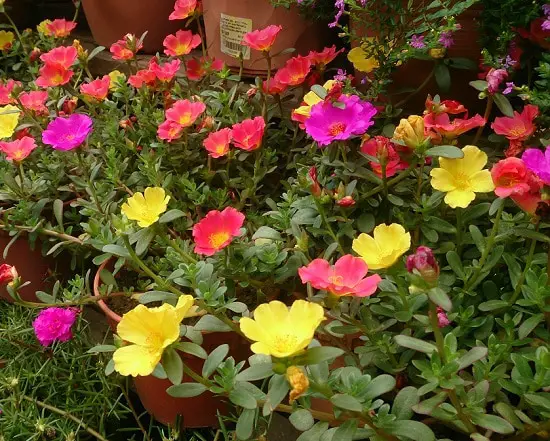
Botanical Name: Portulaca oleracea
USDA Zone: 10-11
Purslane is a low maintenance plant that thrives in warm weather. It forms beautiful succulent foliage with white, orange, or rose-colored flowers and can reach up to 4-8 inches long. It is perfect for growing in window boxes, hanging baskets, or as a groundcover.
Note: Grow purslane in well-draining soil under full sun.
Check out our article on growing Purslane here!
8. Canna
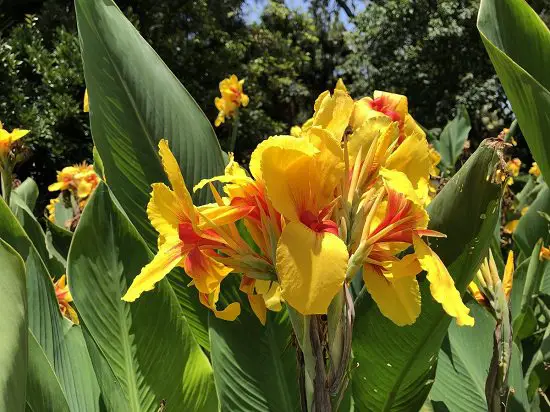
Botanical Name: Canna hybrida
USDA Zone: 7-11
This easy to care tropical bulbs are admired for their large leaves. Canna plant opens in ornamental stalks of red, yellow, orange, pink, salmon, or bi-colored flowers, from mid to late summer in hot, humid conditions.
9. Mexican Petunia
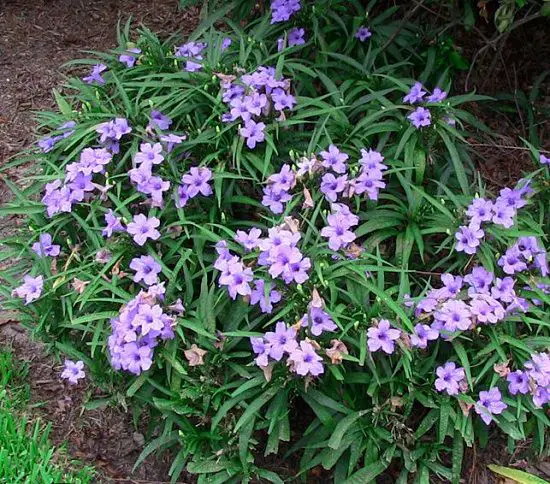
Botanical Name: Ruellia brittoniana
USDA Zone: 9-11
Mexican petunia is a low-maintenance, sun-loving perennial, which is admired for its beautiful pink, blue, white petunia-like flowers, throughout the summer. Grow this plant in full sun or partial shade in moist soil, mulch the soil during dry, hot weather.
Here’s how you can grow Petunia in containers!
10. Shooting Star
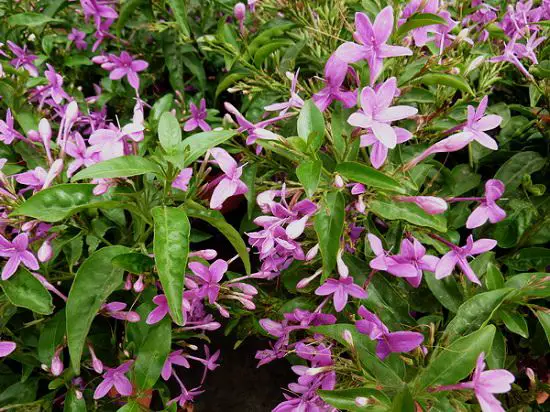
Botanical Name: Pseuderanthemum laxiflorum
USDA Zone: 9a
The shooting star is a beautiful flowering shrub that commands your attention with its star-shaped purple flowers, and glossy green leaves. You can plant it beside walkways, with other shrubs, or along with perennials, where it can reach up to 3-4 feet tall and wide.
11. Coneflower
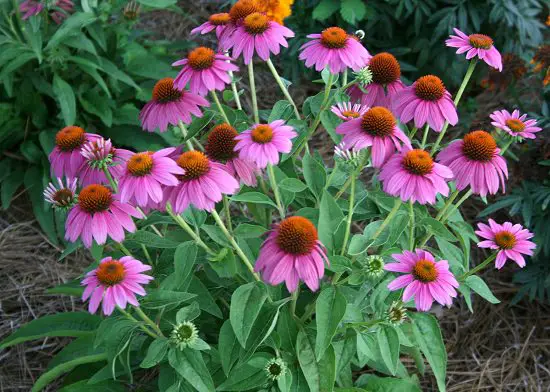
Botanical Name: Echinacea
USDA Zone: 3-8
Coneflower is one of the best flowering perennials, offering a nonstop wave of flowers all summer long! This drought and heat resistant plant feature nectar-rich, pink, red, white, yellow, and orange flowers on 18-36 inches tall stalks. The coneflower prefers 6-8 hours of direct sun and well-drained, rich soil.
12. Blanket Flower
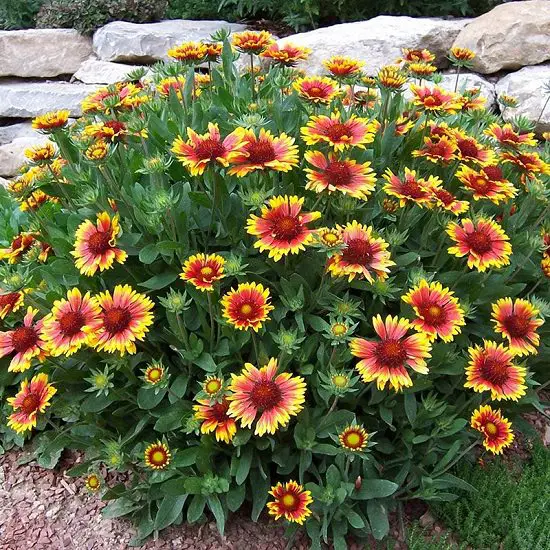
Botanical Name: Gaillardia
USDA Zone: 5-9
The blanket flower is an easy-to-grow, sun-loving plant with patterned or solid flowers in yellow, orange, or red colors, during the entire summer. The plant can grow up to 18-22 inches tall in a sunny area, in well-drained soil with occasional watering.
Fun Fact: It attracts herds of butterflies wherever it is planted!
13. Lamium
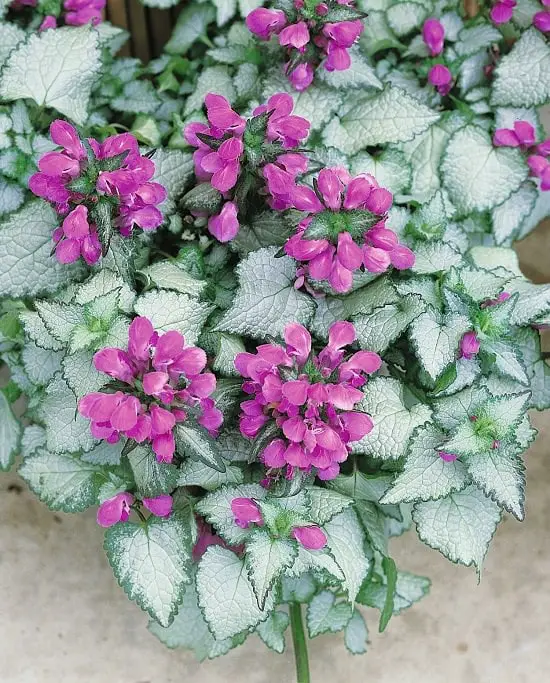
Botanical Name: Lamium
USDA Zone: 3-8
Lamium is also known as dead nettle. It is a fast-growing, spring-flowering variety, that can grow up to 6-8 inches tall and can lighten up dark corners of your garden with pink, silver flowers! Plant Lamium in a semi-shaded area for optimum growth.
14. Zinnia
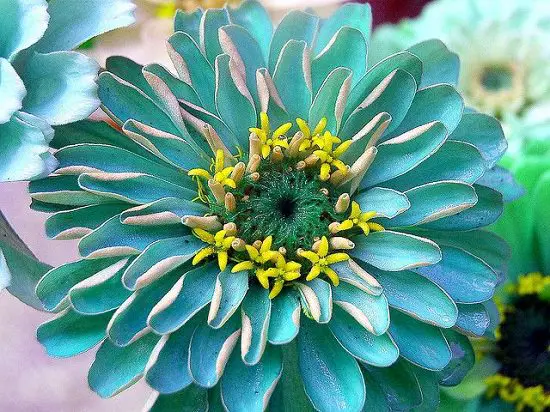
Botanical Name: Zinnia elegans
USDA Zone: 4a-9b
Zinnia is a favorite plant of many gardeners from generations as it is very less demanding. It offers appealing small-large flowers that come in a variety of colors except for blue. Grow zinnia where it gets 6-8 hours of sun, in rich, and well-drained soil. It surely is one of the best flowers to plant in Florida!
15. Firebush
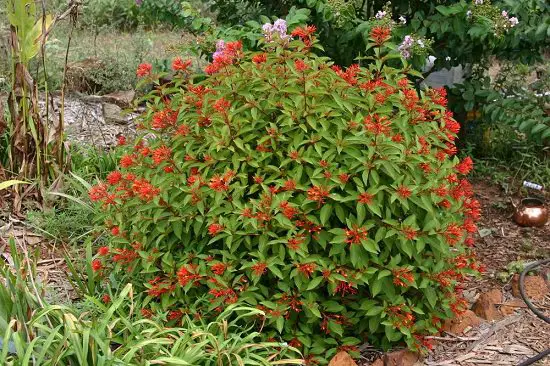
Botanical Name: Hamelia patens
USDA Zone: 9-10
Native to Florida, the firebush is a tropical flowering shrub, that exhibits tube-shaped orange and yellow-colored flowers. It can reach up to 8-10 feet tall, as an annual. Firebush prefers full sun for best flowering, though it can do well in partial shade as well.
16. Persian Shield
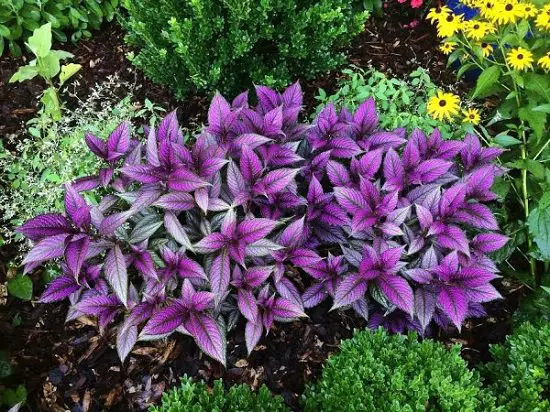
Botanical Name: Strobilanthes dyerianus
USDA Zone: 8-11
Gardeners admire Persian shield due to its striking purple foliage that has a pearly shine. The distinct color makes it an outstanding specimen plant, perfect for garden beds, borders, or containers. Grow Persian shield in full sun to part shade.
17. Sanchezia
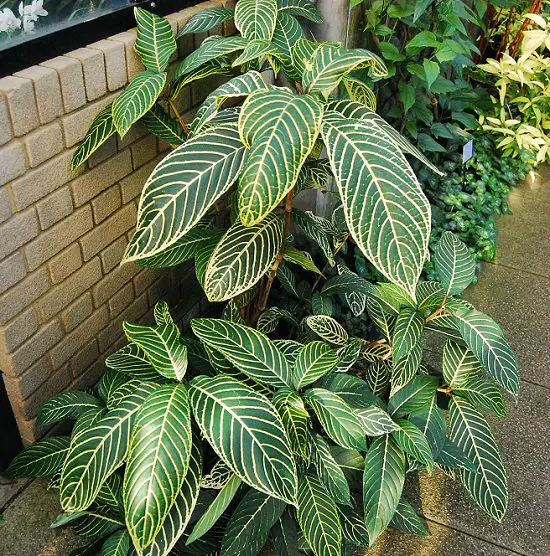
Botanical Name: Sanchezia nobilis
USDA Zone: 10a-11
The main feature of this plant is its colorful foliage. The leaves are veined in cream, gold, or white color. It also produces beautiful yellow flowers from orange bracts in spring, summer, and fall. You can grow this shrub in the shade or partial shade.
18. Lantana
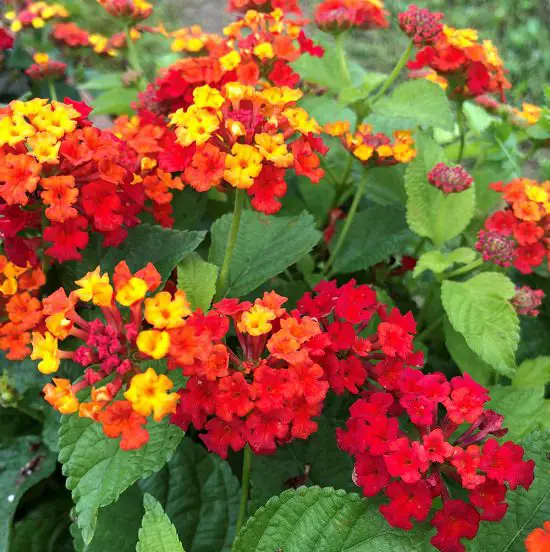
Botanical Name: Lantana Camara
USDA Zone: 9-11
This beautiful plant offers a nonstop wave of nectar-rich, sparkling yellow, red, white, pink, orange, lavender, and bi-color flowers. Lantana plant is ideal for growing in garden beds, in pots, and with other sun-loving blossoms. The plant prefers a warm, sunny climate.
Want to grow Lantana? Here’s how you can easily!
19. Pentas
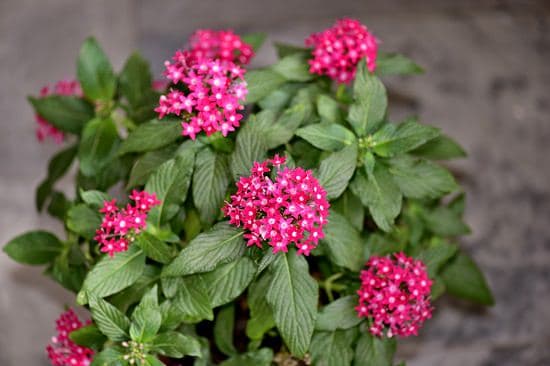
Botanical Name: Penta lanceolata
USDA Zone: 10-11
Pentas forms bright, star-shaped flowers, during the entire summer, in bold shades of purple, red, white, pink, or purple. This perennial plant can grow up to 18-36 inches long, in a sunny spot, that receives 5-6 hours of bright light.
20. Jacobinia
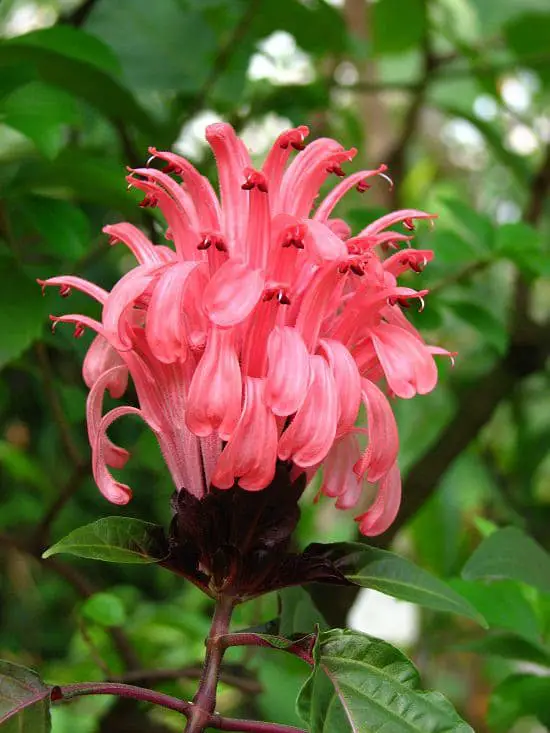
Botanical Name: Justicia carnea
USDA Zone: 8b-11
Also known as Justicia and Brazilian plume, it is a wonderful tropical flowering shrub that offers a cluster of white or pink flowers that resemble fireworks. This is one of the easy-to-grow plants in tropical areas like Southern Florida. It can also be grown as a hedge or as a foundation plant in shady areas.
21. Butterfly Bush
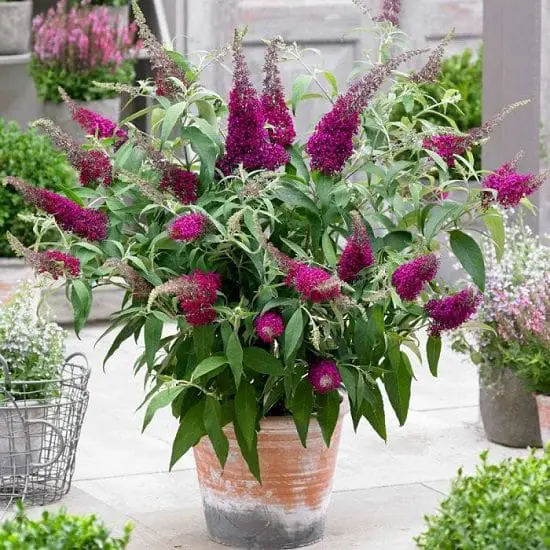
Botanical Name: Buddleia davidii
USDA Zone: 5-10
Butterfly bush is a fragrant plant, that features long spikes of colorful, nectar-rich pink, blue, purple, yellow flowers on 1-6 feet tall stalks. It is drought-tolerant plant and disease-free, growing well in a sunny spot with 4-5 hours of direct sunlight.
22. Cuphea
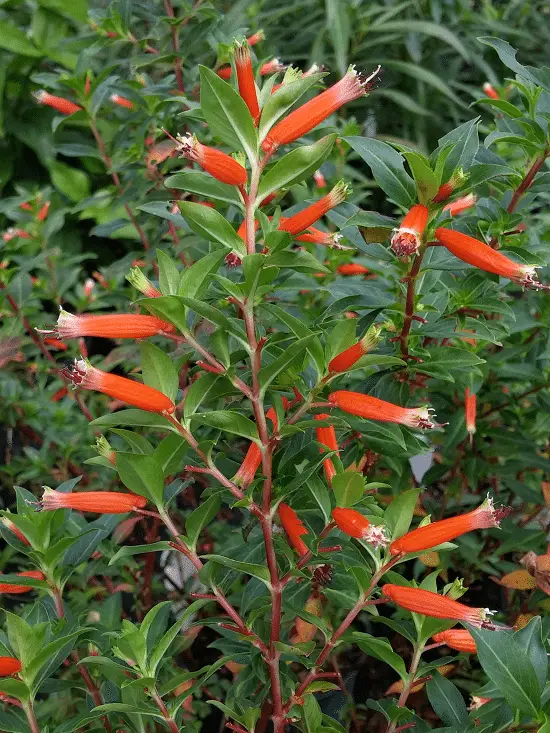
Botanical Name: Cuphea spp.
USDA Zone: 8
Cuphea is grown as an annual in most countries and as a perennial in frost-free regions. It is praised for its hot, fiery red flowers, that the plant produces throughout the summer. It is is heat and drought tolerant and works excellently as a bedding plant.
23. Plumbago
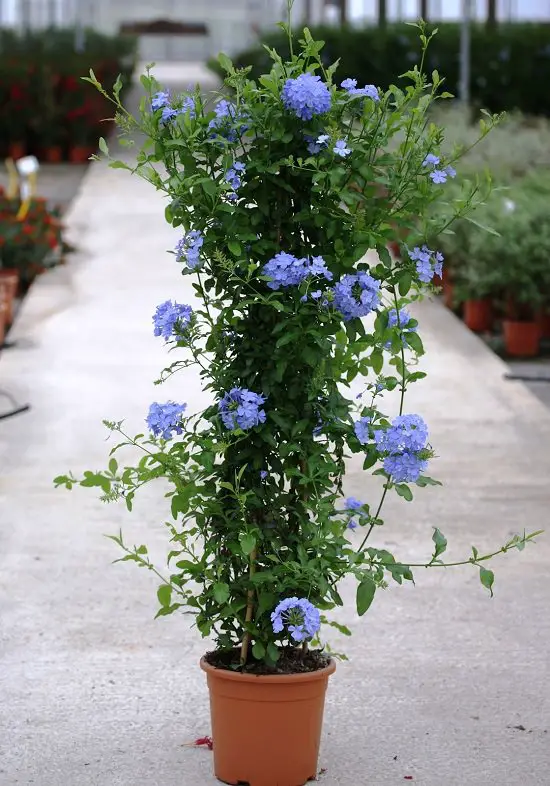
Botanical Name: Plumbago auriculata
USDA Zone: 9-10
Plumbago is a tropical flowering shrub with a bunch of sky-blue blossoms. The plant can grow up to 4-5 feet tall and can be planted with other shrubs as well, in big containers, landscape borders or beds.
24. Verbena
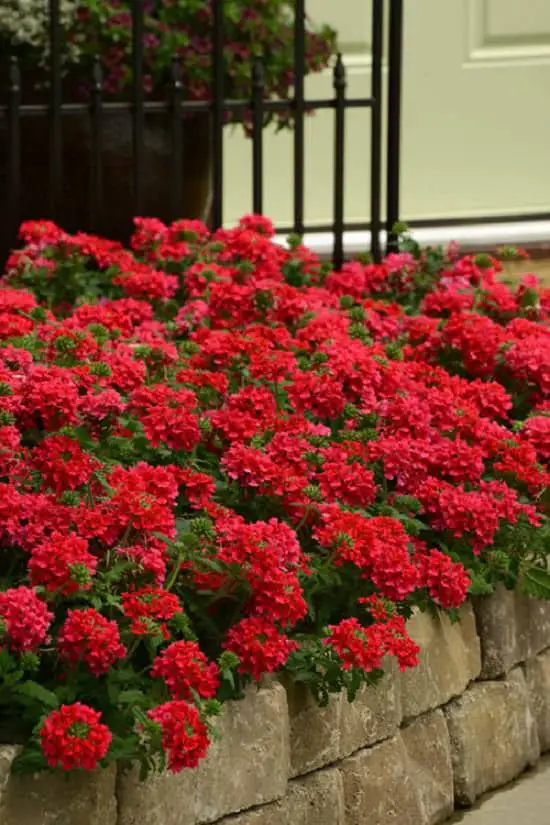
Botanical Name: Verbena spp.
USDA Zone: 7-10
Verbena flowers without pause from early summer to fall. This tender perennial showcases a cluster of nectar-rich red, white, yellow, orange, or bi-colored flowers. It is sun-loving and attains a height up to 12-30 inches in a trailing or upright form.
25. Scaevola
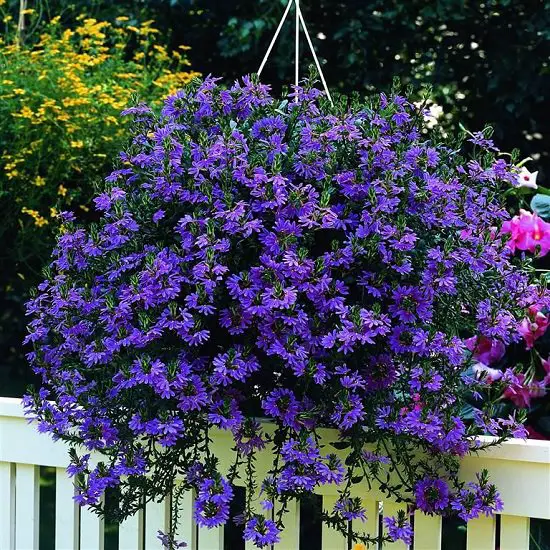
Botanical Name: Scaevola spp.
USDA Zone: 10-11
Occasionally called a fan flower, this sun-loving annual is valued for its encrusted pink, blue, or white flowers and cascading branches that makes it a perfect choice for hanging baskets, window boxes, or containers.
26. Oyster Plant
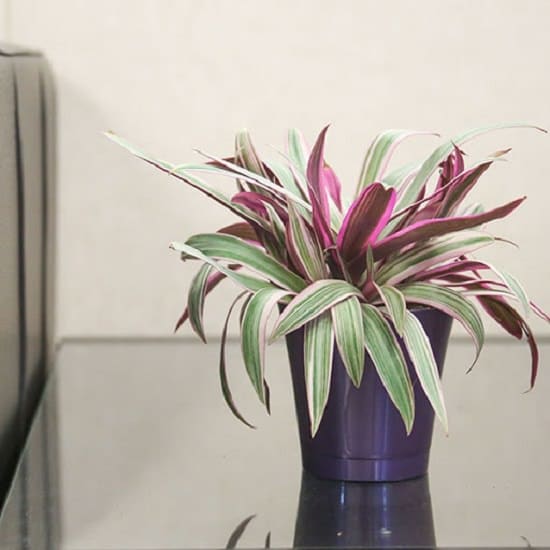
Botanical Name: Rhoeo spathacea
USDA Zone: 9-11
Also known as Moses-in-the-cradle, the oyster plant is a popular, easy to grow indoor and garden plant. This plant is ideal for tabletops, desks and can be grown in bedrooms and kitchens as well. As an indoor plant, grow this in medium to bright light and water it frequently, once or twice a week, according to the climatic conditions.

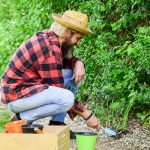

Thanks for the guidance for plants. I’m in a Florida and this gave me a better perspective
Thank you so much for all of the information. Recently moved to Florida from Indiana. Now I have a good idea what to plant in the sun.
I’m a master gardener from NY that moved Florida about 4 years ago. Wow, even with our harsh NY winters and crazy springs, I’m finding that gardening in Florida to be a challenge at times. I think I’m finally having success and finding what works best in my area. A gardener from Disney told me once, “everything you learned in NY, forget when you move to Florida, it’s like a 180”. Lol! Thanks for this guide. It’s well appreciated.
I am new to the area too (from Wisconsin), so thanks for the advice!
I find Mexican Heather, lantana, blue daze, and plumbego to be fail safe plants. Plant, a few waterings and forget until winter where I cut them back and they come back bigger and better the next year.
Great article! I’m looking for something for flower/window boxes. I am in Central Florida and the location of the boxes are under an overhanging roof, so they get maybe 3-4 hours of direct sun a day.
Super good. I came here many years ago from Utah. I am in zone 10, still have challenges due to weather patterns changing. Your article gave me some insights ai needed.
Thank you! We have a yard project we are working on. This will help in making decisions in some of our choices. Zone 10
Hello we are snow birds from MN – south central Florida, wondering what does best in shade. Thanks
This is an incredibly disappointing list. It’s 2023. It is the responsibility of garden writers and bloggers to educate gardeners on the importance of native plants. There are maybe two Florida native plants here🙄. It is completely irresponsible for this writer to promote plants that are not only non-native to Florida but several are actually invasive plants. Where are the Florida natives that support wildlife, providing nectar, pollen and seeds and most important are host plants for the larva(caterpillars etc that songbirds need to feed their young? It needs to be the goal of every gardener to plant 70% of their garden to native plants. By planting native plants every one of us can restore the bio-diversity that alien plants can never do.
so what do you recommend to plant here n Florida
What do you suggest
Hate do disagree with Veronika, but as an avid gardener and plant person, I dont think every gardener needs to be planting 70 percent natives in their gardens. When you live in a tropical evironment and can grow anything, the idea of throwing that opportunity away seems short sighted. You can promote preservation in other ways through donations, volunteerring , etc. And to be honest, most natives can look weedy and uncared for most of the year as they go through their dormant cycles and down times. I have known several great gardeners that went all native in their yards, and after a couple years, they ripped them out and started over because they just dont look great. And many invasives can be controlled with confinement or deadheading. If your a gardender, your able to do that. I personally collect some fantastic Hibiscus and Avocado, as well as Mango Trees. For me, why go outside to garden at all if I couldnt plant those. Its more important to promote gardening in itself, than only native plant gardening.
Thank you so much for that wonderful list I have found exactly what I need, but where can I go to find them? I don’t find them at the big Home Depot and Lowe’s. Looking for a huge garden center that just has those kinds of plants where I can go to go from one to the other one by one I need
Tampa FL area Ideas PLEASE